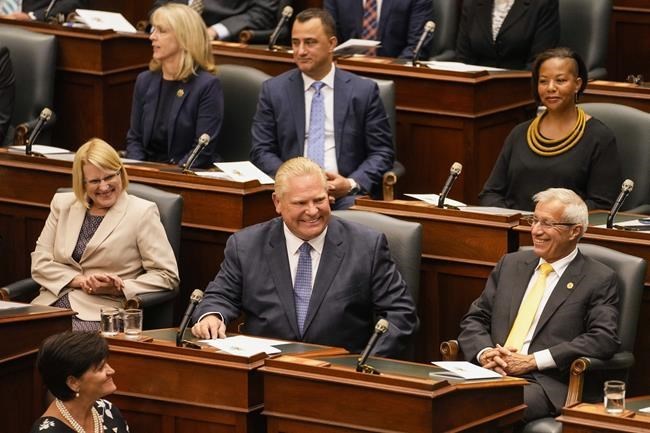TORONTO — Prime Minister Justin Trudeau is criticizing the Ontario government's use of the Constitution's notwithstanding clause in legislation to impose contracts on education workers and ban them from striking.
Trudeau made the comments a day after Ontario tabled a bill meant to avert a planned strike by 55,000 education workers. Using the notwithstanding clause to suspend workers’ rights is wrong, he said.
"I know that collective bargaining negotiations are sometimes difficult, but it has to happen," he said in Ottawa on Tuesday.
"It has to be done in a respectful, thoughtful way at the bargaining table. The suspension of people’s rights is something that you should only do in the most exceptional circumstances, and I really hope that all politicians call out the overuse of the notwithstanding clause to suspend people’s rights and freedoms."
The clause allows the legislature to override portions of the Canadian Charter of Rights and Freedoms for a five-year term.
Federal Labour Minister Seamus O'Regan called the pre-emptive use of the notwithstanding clause a "travesty" and federal Justice Minister David Lametti said he is looking at how Ottawa could challenge it.
"It de facto means that people's rights are being infringed and it's being justified using the notwithstanding clause," Lametti said. "Using it pre-emptively is exceedingly problematic. It cuts off both political debate and judicial scrutiny."
Ontario's legislature began sitting at 5 a.m. Tuesday for debate over the bill, as the government hopes it can be passed by the end of the week, ahead of a planned strike by the Canadian Union of Public Employees.
But there was also a hint of movement at the bargaining table Tuesday.
CUPE proposed acounter-offerlate in the day and government negotiators are now set to review it. The government has said it would return to the table if the mediator asks, and wanted to hear if CUPE's new offer is "reasonable."
Premier Doug Ford said in question period that the government's offer is "very fair," and suggested he looks out for the front-line workers but not their union heads.
"We aren't going to feather the nest of the head of CUPE," he said. "We differentiate between labour and labour leadership. I think the labour needs to find new leadership."
More than 96 per cent of CUPE's education worker members voted in favour of a strike.
CUPE has said the approximately 55,000 education workers it represents – such as early childhood educators, custodians and librarians – will walk off the job Friday regardless of the legislation. It has not yet indicated whether the walkout would extend beyond Friday.
Several school boards, including the Toronto District School Board, have said they will have to close schools that day in response.
The government had been offering raises of two per cent a year for workers making less than $40,000 and 1.25 per cent for all others, but Education Minister Stephen Lecce said the new, imposed four-year deal would give 2.5 per cent annual raises to workers making less than $43,000 and 1.5 per cent raises for all others.
CUPE has said its workers, which make on average $39,000 a year, are generally the lowest paid in schools and it has been seeking annual salary increases of 11.7 per cent.
Several unions have made statements in solidarity with CUPE, most notably the Labourers' International Union of North America, which endorsed Ford's Progressive Conservatives in the June election.
LiUNA wrote to Lecce urging him to revoke the legislation.
"Restricting collective bargaining and the right for unions to strike and negotiate freely through the implementation of back-to-work legislation and enacting the notwithstanding clause sets a dangerous precedent that aims to erode respect for collective bargaining rights and unionized labour in Ontario," LiUNA's international vice-president and central and Eastern Canada regional manager Joseph Mancinelli wrote.
- with files from Mia Rabson in Ottawa
This report by The Canadian Press was first published Nov. 1, 2022.
Allison Jones, The Canadian Press

